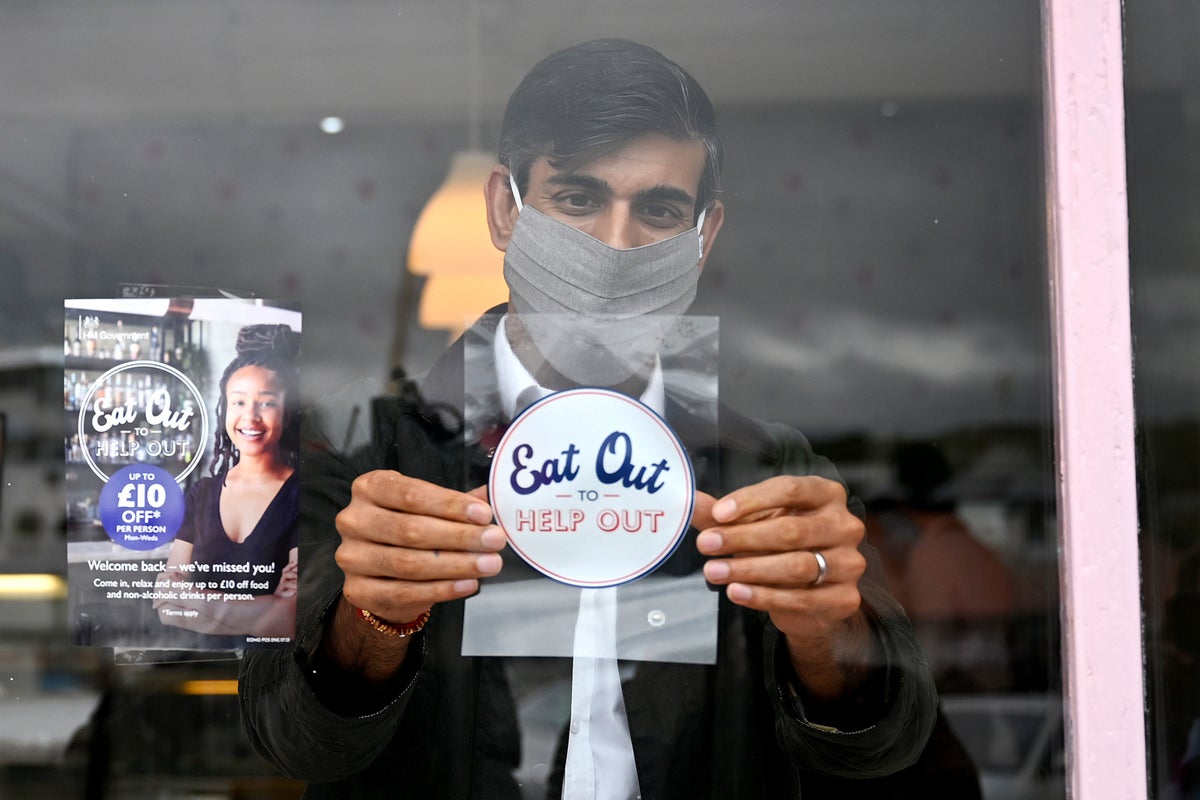
Get the free Morning Headlines email for news from our reporters across the world
Sign up to our free Morning Headlines email
Rishi Sunak apologised to bereaved families this morning as he began his testimony examining the government’s handling of the Covid crisis.
The prime minister will be grilled on the ‘Eat Out To Help Out’ scheme he orchestrated while serving as chancellor. The controversial plan to revitalise Briton’s hospitality sector formed part of Mr Sunak’s summer economic update in July 2020, providing 50 per cent off the cost of food and drink in bars and restaurants across the UK.
Only available on Mondays, Tuesdays and Wednesdays, the scheme was aimed to protect jobs in the hospitality sector and was one of several support measures that included VAT cuts, small business grants and rates relief.
Rishi Sunak has apologised to the bereaved families during the Covid Inquiry
(PA)
However, messages between government scientists have since revealed that Mr Sunak had been referred to as “Dr Death, the Chancellor”, while the top two advisers claimed they had not been consulted in advance about the scheme.
Professor Sir Chris Whitty, England’s chief medical officer, is also said to have privately referred to the scheme to boost the restaurant industry as “eat out to help out the virus”.
Giving evidence to the Covid-19 inquiry, Sir Patrick Vallance, the chief scientific adviser, said the scheme was “highly likely” to have fuelled deaths.
Meanwhile, one of his diary entries recorded Dominic Cummings, who was former prime minister Boris Johnson’s chief adviser in Downing Street at the time, saying Mr Sunak “thinks just let people die and that’s OK”.
The Independent have taken a look at the success of the scheme, and the impact it had on positive testing:
Did the Eat Out to Help Out scheme increase Covid-19 rates?
Due to there being a delay between infection and a positive result showing up in official Covid figures, August infections may not have appeared in the data until September.
However, case numbers from testing in the UK increased by roughly 250 per cent over the course of the month.
COVID campaigners and families of those who died during the pandemic hold placards and photographs of loved ones
(AP)
Official figures showed 6,400 people tested positive during the first of August, which increased to around 23,000 by the second week of September.
A study from the University of Warwick reported a link between the scheme and the virus, estimating that it may have increased the numbers of Covid-19 by 20 per cent.
Given that death involving Covid often took a month to run its course, it is likely that many infections from August would not have ended in death until the following month.
Data shows that in September, nearly 900 deaths in the UK were related to Covid, an increase of 550 from the previous month.
However, other European countries also recorded an increase in cases during this period, as Spain and France opened their doors to holidaymakers and tourists to boost their economy.
The Eat Out to Help Out scheme has been heavily scrutinised in hearings of the Covid-19 public inquiry (PA)
(PA Archive)
The rise in the UK can also be attributed to children returning to school and people returning to offices, as the stringent lockdown rules gradually began to ease.
“I doubt that the UK’s Covid-19 epidemic in late 2020 would have unfolded that differently without Eat Out to Help Out,” Prof Mark Woolhouse, a scientist involved in Sage, the government’s scientific advisory body, told the Covid inquiry.
How much did the scheme boost the economy?
At the time the scheme was announced, the UK was beginning to open up after three months of lockdown, with hospitality businesses opening their doors on 4 July.
While people could mingle in groups of up to 30, it was recommended to avoid groups larger than six and to stay within your household bubble.
During the course of August, 160 million meals were served while the scheme cost the government £840m.
Over 52,000 businesses registered for Eat Out to Help Out (EOHO) and over government statistics show that 49,000 of these had made a claim for the scheme by 30 September.
The Office for National Statistics found however that a higher proportion of restaurant spend on Revolut debit cards happened between Monday to Wednesday, despite the overall economic activity in hospitality sector remaining down on the previous August.
✕
Subscribe to Independent Premium to bookmark this article
Want to bookmark your favourite articles and stories to read or reference later? Start your Independent Premium subscription today.
SubscribeAlready subscribed? Log in
Popular videos
{{/link}}

